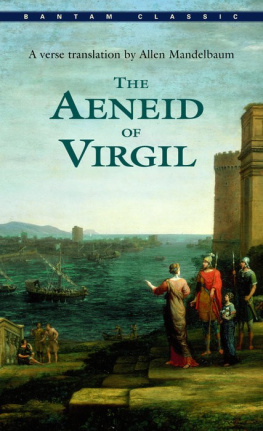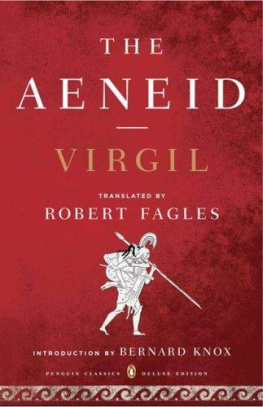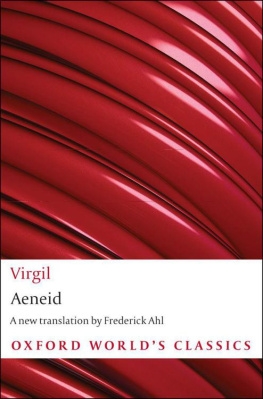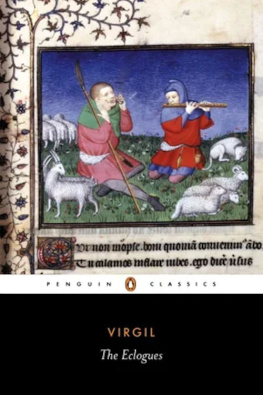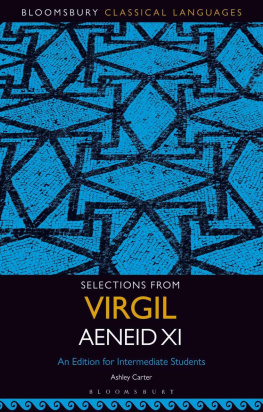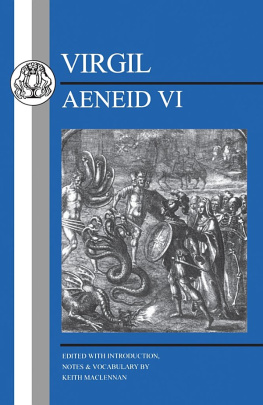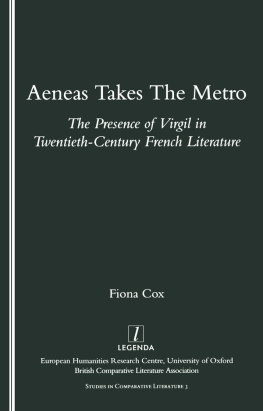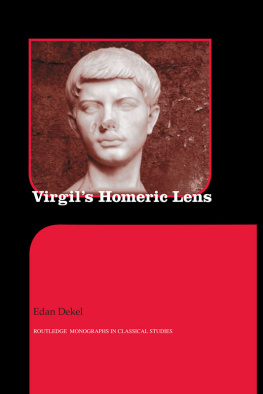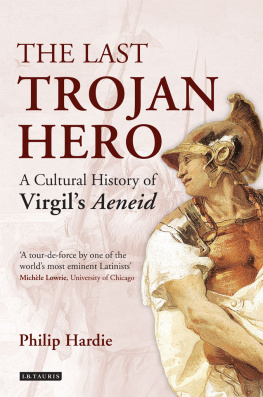
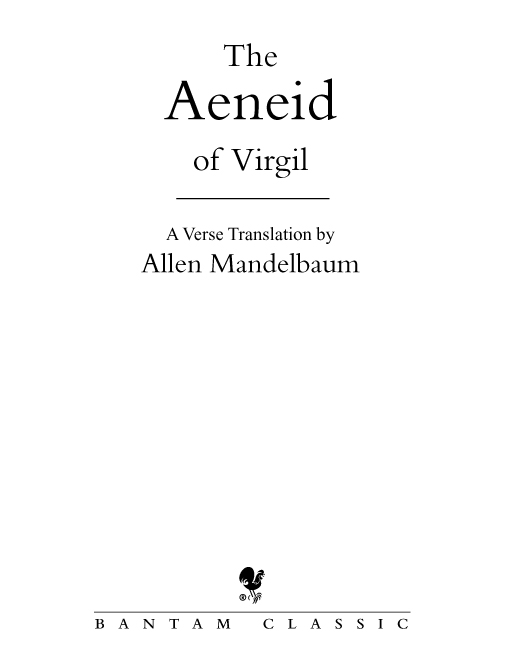
Contents
THIS TRANSLATION IS INSCRIBED TO:
Giuseppe Ungaretti, for Aeneas,
lost Dido, pious Palinurus, and
the mind that moves across your Promised Land;
and Jonathan, my son, for a Dogon horseman
you hunted down one hot September noon,
that rider on the plains of Troy within us.
Rome San Francisco Orta S. Giulio New York
May 1964 May 1970
in memoriam
Giuseppe Ungaretti
February 8, 1888June 1,1970
INTRODUCTION
I was late come to a full encounter with the Aeneid. Three judgments stood in my way. One was a tag line of Mark Van Doren that echoed through my youth with tenacious resonance: Homer is a world; Virgil, a style (a late variant of Coleridges: If you take from Virgil his diction and metre, what do you leave him?"). The second was a passage in a book long since hallowed for me, Georg Lukcs Die Theorie des Romans: The heroes of Virgil live the cool and limited existence of shadows, nourished by the blood of noble zeal, blood that has been sacrificed in the attempt to recall what has forever disappeared. The third was Concetto Marchesis personal version of the traditional comparison between Homer and Virgil in the most lucid history of Latin literature we have, his Storia della letteratura latina. There he was so alert to every defect of the Aeneid that its virtues seemed secondary. Marchesi was so splendid on Lucretius, then central to me, that with an illogical extension of trust, I allowed his estimate of the Aeneid to usurp my own reading.
All three obstacles were variations on the theme of Homer versus Virgil, using the father to club the son, coupled at times with some variations on the theme of Dante versus Virgil, using the son to club the father. Whichever way one turned in the line of affiliation (Homer-Virgil-Dante)toward parricide or filicidethe middleman Virgil lost. Nor did another son of that same line, Milton, the English poet who filled the largest space within me when I was growing up, clear the way to the Aeneid. Milton was too separate, too massive a mountain then for me to see what lay behind him.
Three ways led me across these obstacles. On one I walked alone; on two my guides were Dante and Giuseppe Ungaretti. Let me begin with Ungaretti, who died as this preface was being written, one of two to whom this translation is dedicated. In the season of his life, in the autumn of his life that followed Sentimento del tempo (Sentiment of Time), Ungarettis meditations mingled with Virgilian evocations in La Terra Promessa (The Promised Land). This was published in final form in 1950 with the Dido choruses and Palinurus sestina; in 1960 his Il taccuino del vecchio (The Old Mans Notebook) appeared with an additional 27 Final Choruses for the Promised Land. In the mid-50s I had translated and introduced the 1950 Promised Land in Poetry and then in a volume of Ungarettis selected poems called Life of a Man; and the final stages of the revision of the Aeneid were completed even as I prepared for publication a much fuller Selected Poems of Giuseppe Ungaretti, which includes some of the 1960 choruses. In those mid-50s years, then, these words of Ungaretti were often with me:
Perennial beauty (but bound inexorably to perishing, to images, to earthly vicissitudes, to history, and thus but illusively perennial, as Palinurus will say) assumed in my mind the aspect of Aeneas. Aeneas is beauty, youth, ingenuousness ever in search of a promised land, where, in the contemplated, fleeting beauty, his own beauty smiles and enchants. But it is not the myth of Narcissus: it is the animating union of the life of memory, of fantasy and of speculation, of the life of the mind; and it is, too, the fecund union of the carnal life in the long succession of generations.
Dido came to represent the experience of one who, in late autumn, is about to pass beyond it; the hour in which living is about to become barren; the hour of one from whom the horrible, tremendous, final tremor of youth is about to depart. Dido is the experience of nature as against the moral experience (Palinurus).
... La Terra Promessa, in any case, was, and is still, to begin at the point at which, Aeneas having touched the promised land, the figurations of his former experience awaken to attest to him, in memory, how his present experience, and all that may follow, will end, until, the ages consumed, it is given to men to know the true promised land.
Even when allegorical readings were less in fashion than they are today, Ungaretti could have been seen not only as using Virgil but as seeing into him. Here Ungarettis Virgil is seen both from the autumn of a civilization, across the long divides of memory, and as the autumnal voice of a civilization, just as he is in Ungarettis strangely beautiful reading of the first canto of the Inferno. In the later 1960 choruses, the promised land of Virgil fuses with the promised land of the Bible and with the terminus of all desire. But the true promised land is never a certainty. Much recent criticism has seen the ache and bite of doubt in the Aeneid, ever lessas we read morea triumphant poem in praise of the imperium of Caesar Augustus. But for me, it was chiefly through Ungaretti that I saw in the Aeneid the underground denialby consciousness and longingof the total claims of the state and history: the persistence in the mind of what is not there, of what is absent, as a measure of the present. The young Lukcs who found Virgil too utopian, that is, casting back for what is irretrievable, was himself, at the end of Die Theorie des Romans, to leave the way open for his own later castings ahead, his affirmations of utopia as nearer and perhaps here, in the same climate that allowed the absolute conviction of Trotskys 1924 coda to Literature and Revolution: The average human type will rise to the heights of an Aristotle, a Goethe, or a Marx. And above this ridge new peaks will rise. Virgil was never so utopian, he never so deified the present or the future, and, as we shall soon see, he understood better the dynamics of deifying the past.
Witness: Van Doren in The Noble Voice, following a brilliant suggestion of Jacob Klein, brings to bear a passage from Platos Statesman on the section in Book VI where Anchises says, But all the rest, when they have passed times circle / for a millennium, are summoned by / the god to Lethe in a great assembly / that, free of memory, they may return / beneath the curve of the upper world, that they / may once again begin to wish for bodies. In citing the Statesman, Van Doren assumes that Virgil was geared to the lulling myth of cycles, that he hoped for peace by miracle and magic, never coming to terms with the fact that civilization is arduous. But the man who had written the Georgics knew what human labor was; as did the man who, born in 70 , spent the last eleven years of his life, before his death in 19 , at work on one poemleaving it still incompletely revised. He was not wagering all on the gods or on the man-made god Augustus. Not only is the very myth Anchises posits framed by the terminus of Book VI, with the query raised by Clausen as to its meaning; another, less enigmatic passage, often neglected, reminds us of how complex was Virgils vision of god-making. In Book IX, 243246, Nisus, about to embark on a mission, asks his comrade Euryalus: Euryalus, is it / the gods who put this fire in our minds, / or is it that each mans relentless longing / becomes a god to him? And the god of Nisus and Euryalus plays them false.
Next page
